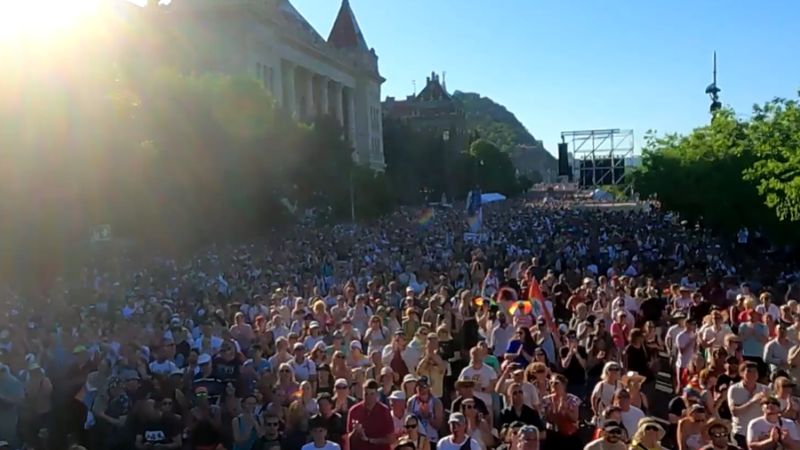Record crowds have marched on the streets of Budapest to show their support for the Hungarian LGBTIQA+ communities.
The Hungarian government banned this years Budapest Pride Parade, threatened attendees with fines and being track down via facial recognition technology, and police approved a march from a right wing group to be scheduled at the same time, but organisers estimate over 200,000 people turned up to show their support.
The 30th Budapest Pride parade has made headlines around the world, as the previous record for participation was 35,000. The estimated crowd of over 200,000 were not only local people but thousands who flocked from across Europe and around the world.
They marched from Budapest City hall and traversed through the city centre before crossing the capital’s iconic Erzsébet Bridge over the Danube River.

In the months leading up to the parade the conservative Orban government changed the country’s constitution to allow for strict new laws banning gatherings that promoted the LGBTIQA+ communities.
On Friday ahead of the parade, as the record number of people swarming into the capital became apparent, the government said it would not break up the gathering but warned organisers they would face legal consequences.
The new laws means those held responsible for organising the event could face fines of AUD$898 or a year in prison. Many marchers held up signs that mocked Prime Minister Victor Orban.
Earlier this week European union chief Ursula von der Leyen called on the country to reverse the ban, and thirty three nations, including most of the country’s European neighbours, have signed a letter calling for change.
Following the parade government spokesperson Zoltan Kovacs said the countries opposition parties had staged the parade “at Brussels command” and accused them of mocking the countries sovereignty.
“With Pride, the opposition incited against laws they don’t like, mocked Hungary’s sovereignty, and — with foreign backing — tried to force woke culture onto us,” he wrote on social media.
Opposition leader Peter Magyar said the government had “scored not a goal, but a huge own goal with their attempt to ban today’s event”. While Mayor of Budapest Gergely Karacsony said the parade had shown Hungarians wanted a more tolerant society.
Hungary’s election will be held in 2026 and Orban’s longstanding government is expected to face fierce opposition after a decade of cracking down on personal freedoms.





